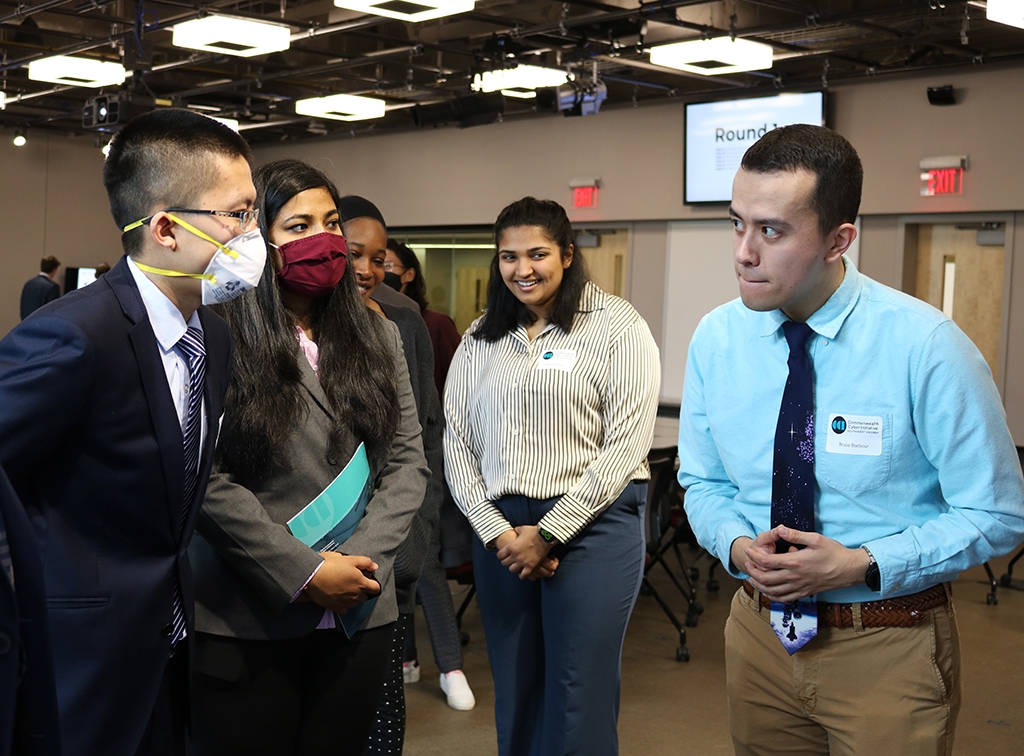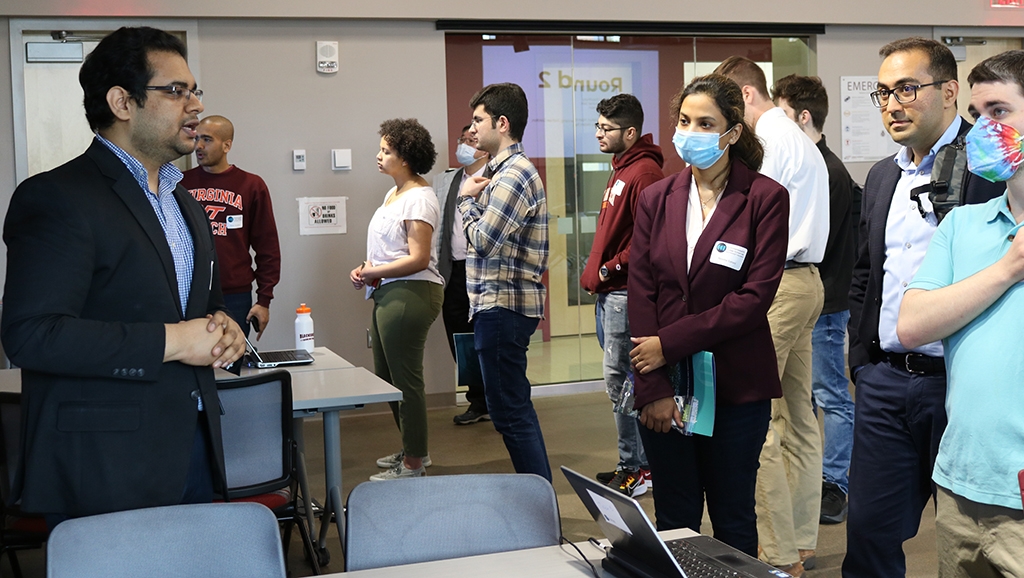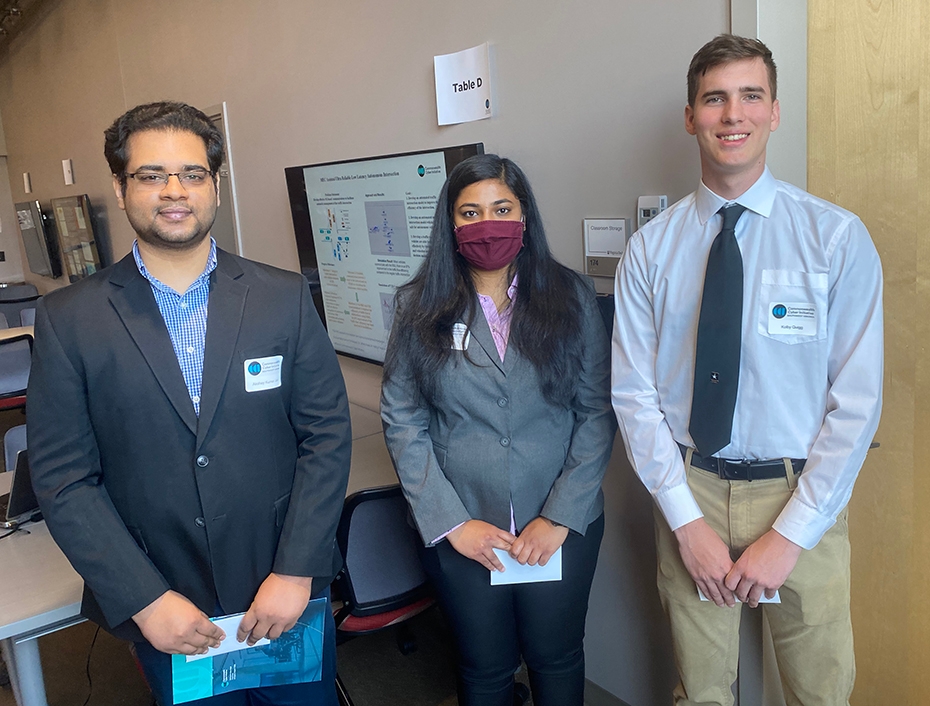Cybersecurity showcase conveys impact and reach of student research

Six screens, four 15-minute rounds, 40-plus student researchers, one room full of future cybersecurity leaders, and a lot of good ideas — the inaugural Commonwealth Cyber Initiative (CCI) Student Researcher Showcase on March 18 demonstrated the strength and promise of student cybersecurity research across disciplines.
“You are an important part of something very special,” said Gretchen Matthews, professor of mathematics and director of the Commonwealth Cyber Initiative in Southwest Virginia who addressed graduate and undergraduate researchers, faculty, and community members at the event. “Together we are a highly coordinated network that leverages researchers with diverse perspectives and backgrounds to address today’s cybersecurity challenges and secure future technology.”
The student researchers represented institutions from the Southwest Node of CCI, which includes Virginia Tech, Virginia Military Institute, Radford University, the University of Virginia at Wise, and a network of community colleges. For about 90 minutes, the Integrated Security and Education Research Center buzzed with people circulating among electronic posters, sharing and learning about the wide spectrum and impact of CCI student research.
The scope of their projects ran the gamut — from a battle drone racing competition to post-quantum cryptography to addressing cyber risk in agricultural data systems through experiential learning. Bruce Barbour, a Virginia Tech graduate researcher in aerospace engineering, presented his work on a hardware-in-the-loop network test bed for small satellites.
“The mission and objectives of CCI have enabled us to become more aware of the potential dangers of cyber activities,” said Barbour. “Developing a satellite network requires diligent and careful planning to ensure safety of all users and systems. It's not all about getting the technical mission done.”
Kellie Johnson, a graduate researcher from Virginia Tech’s Department of Agricultural, Leadership, and Community Education, presented her study that addressed the increased cyber risk of food and agricultural data systems through the lens of experiential-learning teaching. She is developing a model to bring new resources to the classroom and cross-train undergraduate students in this field.
“What's most exciting about this project is watching how the students who are participating in the course develop over time as they enter their internship placements following the semester,” said Johnson.

The three Best Poster Award winners were announced in the final moments of the showcase:
Maximizing efficiency in a crowded radio spectrum
The number of connected devices competing for a slice of the already-crowded radio spectrum continues to skyrocket. Naru Jai, Virginia Tech electrical and computer engineering graduate student, shared her team’s approach to maximizing spectrum efficiency while ensuring interference resilience for high-priority users of the Citizen Broadband Radio Service band.
Jai’s teammates included Shaoran Li and Chengzhang Li, both graduate researchers in electrical and computer engineering. Tom Hou, the Bradley Distinguished Professor of Electrical and Computer Engineering, served as the faculty principal investigator.
Secure integration of renewables into the power grid
As electrical grids integrate more renewable energy sources like solar panels and electric vehicles, communication channels that manage control commands are vulnerable to cyberattack. Akshay Kumar Jain, Virginia Tech electrical and computer engineering graduate student, outlined cybersecurity techniques to detect and counter falsified commands and other attacks. Jain’s teammates were graduate researchers Nitasha Sahani and Baza Somda. Chen-Ching Liu, the American Electric Power Professor in electrical and computer engineering, served as the faculty principal investigator.
Threat detection as a service
With the ongoing implementation of 5G technology, industry networks are susceptible to privacy leaks. Current cybersecurity analysis models are largely stand-alone services. Kolby Quigg, an undergraduate researcher from Virginia Military Institute’s Computer and Information Sciences Department, presented his team’s model for a web-based software-as-a-service approach to threat detection. Quigg’s teammates were undergraduate researchers Tanner P. Mallari and Tristan Dennis. Sherif Abdelhamid, Virginia Military Institute assistant professor and CCI Fellow, served as the faculty principal investigator.
The showcase participants will have the opportunity to present their research to a statewide audience in April at the 2022 CCI Symposium in Richmond.







